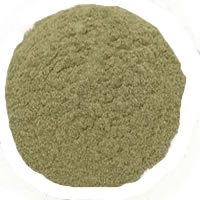Blessed Thistle Purchase & Information

Alternative Names
Carbenia Benedicta, Cnicus, Carduus, Cardo Santo, Chardon Béni, Carduus Benedictus, Chardon Marbré, Chardon Bénit, Cnici Benedicti Herba, Cardo Bendito, Holy Thistle, Safran Sauvage CAUTION: Please refer to separate listing for Milk thistle
Scientific Name
Cnicus Benedictus
Why Do People Use Blessed Thistle?
For oral purposes, blessed thistle powder is utilized for the treatment of indigestion, loss of appetite, as an expectorant, as an antidiarrheal, diuretic and antibiotic. Not only this but there are many other oral uses of Cnicus benedictus (blessed thistle). For instance, it is used to cure cold and fever and to promote lactation.
For topical purposes, it is used for promoting healing of wounds, and as poultice for boils and ulcers.
For manufacturing purpose, it is used as flavoring agent in alcoholic beverages.
Is It Safe To Use?
Possibly safe - It is considered possibly safe as oral herb and when used in appropriate doses. It is generally found in food items. In the U.S, blessed thistle powder has been given Generally Recognized as Safe status (GRAS) for usage in food item.
Possibly Unsafe in Pregnancy - Cnicus benedictus is unsafe to use so it should avoided in pregnancy.
How Effective Is Blessed Thistle?
Regarding effectiveness of blessed thistle powder, there is insufficient reliable information available.
How Blessed Thistle Works?
Most effective parts of Cnicus benedictus are leaves, flowering tops and its upper stems. Bacteriostatic properties are associated with blessed thistle powder due to its volatile oil content. The cnicin and sesquiterpene lactone constituent may have antitumor and antibacterial activities. Certain constituents of blessed thistle undergo metabolism after oral consumption. These constituents include tracheoloside, arcitin. After metabolism, these constituents are converted into compounds that inhibit the release of histamine from the mast cells and cyclic-AMP phosphodiesterase activity. There is 8% tannins in Cnicus benedictus.
What Are The Side Effects /Adverse Reactions of Blessed Thistle?
Blessed thistle can cause problems like vomiting and stomach irritation when utilized in high dosage of more than five grams in each cup of tea. Several case reports have been published where people reported allergic reactions after consuming blessed thistle powder. This is particularly true for those who are sensitive to the plants of Compositae/ Asteraceae family. These family members include plants like chrysanthemums, ragweed, daisies, marigolds and other herbs.
How Blessed Thistle Interacts With Other Herbs and Supplements?
Not known.
How Blessed Thistle Interacts With Drugs?
Antacids - Interaction of blessed thistle and antacids is of minor significance but be careful of this mixture. Clinical researches have proven that Cnicus benedictus increases acidity of stomach and it may reduce the antacid effectiveness.
H2-Blockers - Interaction of blessed thistle powder and H2-bloackers is of minor clinical importance but be careful of this mixture. Clinical researches have proven that blessed thistle increases acidity of stomach and it may reduce the H2 Blockers effectiveness. H2 blockers consist of ranitidine (Zantac), famotidine (Pepcid), nizatidine (Axid) and cimetidine (Tagamet).
Proton Pump Inhibitors (PPIs) - Interaction of blessed thistle powder and Proton Pump Inhibitors (PPIs) is another minor interaction of Cnicus benedictus with drugs but be careful of this mixture. Clinical researches have proven that blessed thistle increases acidity of stomach and it may reduce the Proton Pump Inhibitors (PPIs) effectiveness. Proton Pump Inhibitors (PPIs) include lansoprazole (Prevacid), omeprazole (Prilosec), pantoprazole (Protonix), rabeprazole (Aciphex) and esomeprazole (Nexium).
How Blessed Thistle Interacts With Foods?
Not known.
How Blessed Thistle Interacts With Lab Tests?
Not known.
How Blessed Thistle Interacts With Diseases and Conditions?
Cross-Allergenicity - Several case reports have been published where people reported allergic reactions after consuming blessed thistle powder. This is particularly true for those who are sensitive to the Compositae/ Asteraceae family. These family members include plants like chrysanthemums, ragweed, daisies, marigolds and other herbs.
Gastrointestinal (GI) Irritation - Blessed thistle powder has the potential to irritate GI tract. Blessed thistle is therefore contraindicated in individuals with inflammatory or infectious GI conditions.
What Should Be the Dose/Administration of Blessed Thistle?
ORAL For oral consumption, typical dosage of dried flowering tops is 1.5 5o 3 grams in the form of a tea, consumed thrice every day. Such tea is made by steeping the dried flowering top in hot boiling water. 1.5 to 3 mL of liquid concentrate in ratio of 1:1 in 25% concentrated alcohol is usually used thrice every day.
TOPICAL There is no topical dosage of Blessed Thistle.
Comments
Blessed thistle was generally utilized in early ages as a tonic for monks and to treat the bubonic plague. The scientific name for blessed thistle is Cnicus benedictus.
General Certificate of Analysis (COA)
Specification sheet links below are a standard copy of the COA less the batch or lot number and manufactures dates. Specification sheet can be dated and should only be considered as a general information. Please contact and request an up to date COA if needed for specific updated information before placing order by filling out the contact form with product name and SKU number. If ordering quantities of twenty five kilos or more contact for availability.
